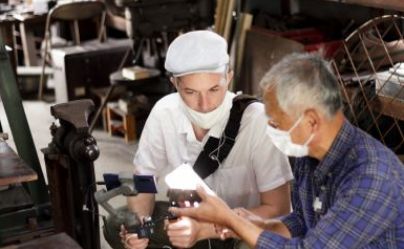
May 13, 2021
Based in Japan: Jim Weisser and SignTime
From short-term English-teaching to serial entrepreneur
By Metropolis
“We use Silicon Valley development and techniques, but a Japanese level of QA/QC, or quality controls,” explains CEO and co-founder of SignTime K.K., Jim Weisser. Born in West Virginia and raised in Texas, Weisser came to Japan in 1993 with a plan that many other international Tokyoites can relate to: to take a few years out of their career path to teach English and experience life abroad. As the internet exploded in 1995, that short-term plan quickly evolved into what would lead him on an almost-30 year journey in entrepreneurial roles around digital transformation in Japan. 2020 marked the year Weisser launched his fourth Japan-based company, SignTime, which focuses on electronic contracts, e-hankoes and digital transformation in a global environment, alongside co-founder Jonathan Siegel.
With so much experience under his belt, Metropolis reached out to Weisser to hear the story of his career pathway, and his advice for other entrepreneurs looking to jump into the business world of Japan.
Why did you decide to stay in Japan?
One reason is that, once you start your own business, without being able to sell things you die pretty quickly. When I started out, I didn’t know anyone who would be potential buyers in the U.S., or in Hong Kong or anywhere else, but I did know a fair number of people in Japan. I’ve been involved in the American Chamber of Commerce here since 1996 which has helped me build a professional network.
Could you tell us more about the ACCJ and how it can be helpful for other entrepreneurs in Tokyo?
The ACCJ is a volunteer organization and it fosters an active and engaged international business community . I’m a past Vice President and currently a co-chair of the digital transformation committee. Being able to go to meetings and just see how high level executives operate and modeling my behavior based on some of this was so helpful for me at the start. There are hundreds of companies that are members and, although it obviously has an American tint to it, about 30 percent of the membership is American, and the rest is Japanese or other nationalities, so it’s actually a very international Chamber of Commerce. That’s not to denigrate any of the other chambers of commerce here, it’s just the size and the approaches for each are different.
What other business networking organizations would you recommend?
There’s a committee part of the ACCJ that’s called the Young Professionals Group. It’s focused on building a depth of network there. I’m personally working with the chamber on recruiting entrepreneurs. I was also on the board of the Japan Market Expansion Competition for a while, JMEC. The alumni network also seems to be pretty good and worthwhile and they’re very professional. I’ve sponsored three JMEC projects and put people through the program.
What’s important to know when starting a business in Japan?
Networking matters and self-discipline is really important. If you’re working by or for yourself, how do you make yourself do everything you need to? When I was starting my second business, Weisser Consulting, which is now Weisser Ideas, I would go to my PC, which was on the other side of the couch. Once I’d walked around that couch, I was at work. It’s kind of like a mental model and I also tracked my time pretty closely. How much time am I spending on sales, marketing, finance?
What’s the story behind SignTime?
When I was leaving Cisco, I was looking at different things to do. My first thought was that I’d set up a Cisco partner that does roughly the same thing that I’ve been doing the last 15 years, which was selling video services for collaborative remote work. I went through the list of things that you needed to work remotely. You need internet security, video and voice communications. But the missing piece was that you needed the ability to sign — a document processor, right? I know you can print it, sign it, scan it and then send it, but that’s neither efficient nor secure. Cisco had all the stuff that we needed except for this electronic signatures product. And [my co-founder] Jonathan Siegel is a pioneer in that space with multiple patents.
Then COVID hit and all of a sudden people had to look at how to work remotely. Whether business will permanently adapt or not, it’s a different question. For example, I remember post-earthquake [in 2011], I thought everyone was going to move to cloud calling, but a lot didn’t. But with COVID-19, people have identified this online communication as a core problem, and they recognize that enabling the workforce is important. So we developed SignTime and made our first pitch last summer.
What have been some of the challenges you faced when launching SignTime in Japan?
One of the challenges is hiring; finding people to join an entrepreneurial role. The second one is that young companies in Japan just don’t have much in the way of credibility and trust. One advantage there is that I at least had some market experience and knew people who were either familiar with me personally or the business area I was in. The third is, like I said, self-discipline.
What would be your advice for other people wanting to start their own business in Japan?
Have some savings before you do it and lower your lifestyle cost as much as you can. For me, rent was really the only big number. Also, hang out with other entrepreneurs. Most entrepreneurs recognize the similarities in what you’re doing, as well as the risks that you’ve taken to do it and can relate to you. You can learn a lot from each other.
Don’t be afraid of failure. I’ve been blessed and cursed with an irrational self-confidence. That doesn’t mean I never feel down — everyone I know has some form of imposter syndrome, regardless of how successful they are in the entrepreneurial space and regardless of how they externally appear. Everyone’s got it. Sometimes I think I’m accomplished, but am I really? I’m still me, and I know everything that’s wrong with me. But don’t be afraid of that.
So long as you handle your failures honorably, it’s fine. For example, I’ve known people whose company has gone bankrupt, or they’ve had to shut it down. Now, there’s a good way to do that, and a bad way to do that. A good way is to contact people and tell them. And amazingly, in a lot of cases, people are like, “Wow, that’s really rough. But it’s been good working with you. Are you looking for some consulting work?” Nobody’s happy for you, but you can get positive exchanges and there are more opportunities that way. People will do business with you again.
On the other side of things, there are people I’ve seen who don’t contact people and go into a hole and hide. But when you’re an entrepreneur, don’t do that. Or if you must do it, do it for a day or two. Okay, fine. I’ve cried now, I’m done. Now I’m gonna go make those hard calls.
The second is, you may build a better mousetrap, but if you’re not out selling that better mousetrap, nobody’s going to buy it. In technology, the landscape is littered with better products.
I think the third thing is don’t be afraid to reach out. Don’t be afraid to ask for help.

try.signtime.com
Want even more business advice in Japan? Check out Weisser’s interview in the Dealmaker Diaries Podcast, or take a look at the advice these other Japan-based entrepreneurs have shared with Metropolis as part of our “Based in Japan” series:

Based in Japan: Ria Scott
“Do you want fear or freedom?”

Based in Japan: Axel Deroubaix on Bringing Japan to the World
How the French entrepreneur teamed up with regional makers to create Peko Peko Box

Based in Japan: Darleen Yaya on Bringing Inclusion to Japan’s Makeup World
From self-taught makeup artist to Japan-based business owner







